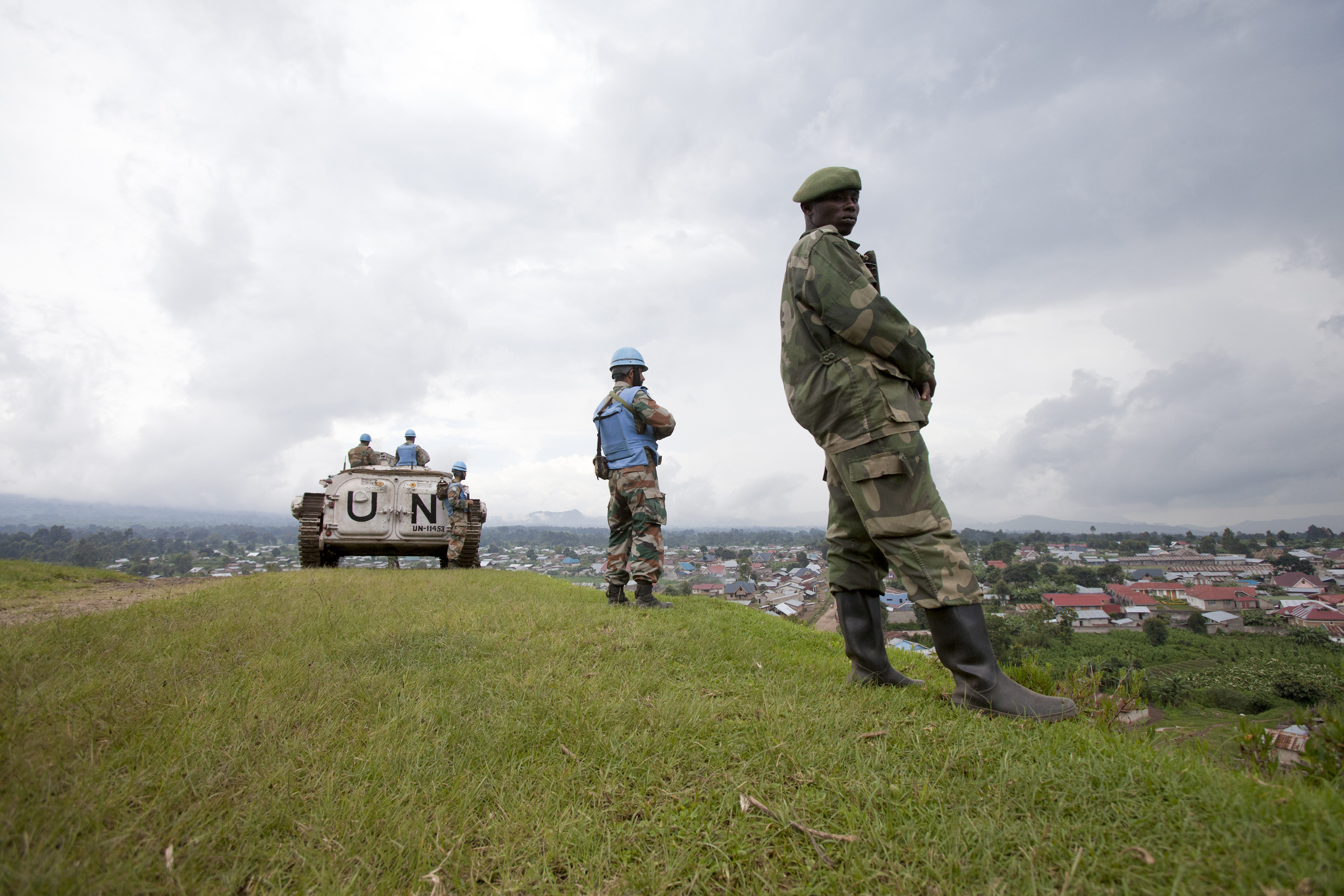
Rumors circulated last week that the M23 rebel group reportedly signed an agreement with eleven other armed groups on April 21, 2013. The groups are said to include FAP-Nyatura, FDC, FPC-AP, FPD, Mai-Mai Cheka, MPA, M26, PARECO Lafontaine, PRM, URDC, and Vutura. They allegedly agreed on mutual defense – an armed attack against any one of them would be considered an attack against them all – in response to an attack by the forthcoming United Nations Foreign Intervention Brigade, or FIB.
Whether or not these rumors are true, one thing is clear: the Kivus will witness a renewed militarization and, if not carefully handled on all sides, potential resulting violence and unrest will negatively impact the lives of hundreds of thousands of civilians.
Today, M23 said that hundreds of its commanders were undergoing special training to face an offensive by FIB, "462 unit commanders have been on a refresher course since Friday in Rumangabo," a large military base in the North Kivu province, the group's military spokesman Vianney Kazarama told AFP. The course's purpose is to "bring them up to speed on how to deal with the brigade's deployment, how to defend themselves," he said. "They are being taught how to react if the brigade hunts them down, how to gather their troops if the going gets tough and how to set up ambushes.”
Meanwhile, preparations for the deployment of the FIB are in full swing. Pursuant to Security Council resolution 2098, 3,069 soldiers from South Africa, Tanzania and Malawi, once deployed, will be mandated to “neutralize” armed groups in eastern Congo, including M23. On April 16, General Babacar Gaye, military advisor to the U.N. Secretary-General, announced that “the deployment of the brigade intervention is imminent.” A week later, on April 22, Tanzania proclaimed that it was ready to send its 800 men at any time. A day later, Commander of the Brigade James Aloisi Mwakibolwa of Tanzania arrived in the provincial capital of Goma for a reconnaissance mission. Last Friday, the Norwegian Refugee Council warned against “excessive faith in [the] new force."
M23 has publicly vowed to “fight back” if attacked by the FIB and, together with its supporters, has written letters to the general public, President Obama, Ugandan President Yoweri Museveni, Secretary-General Ban Ki-Moon, and to the parliaments of South Africa and Tanzania, condemning the FIB. M23 has also reportedly tried twice to convince people living in its controlled territory to demonstrate against the deployment of the FIB but the population refused.
In the face of the forthcoming intervention brigade, M23 reportedly acquired new military hardware such as three Russian-made SAM 7 anti-aircrafts, according to L’Avenir newspaper. In addition, M23 forcibly recruited 59 children in Katale in April alone, according to MONUSCO’s military spokesperson Col. Felix Basse. At the same time, however, the peacekeeping mission reported the defection of 87 M23 rebels in April, amongst them 23 Rwandan nationals and 64 Congolese, including 12 officers. While some of the defectors claim to be tired of fighting and complain about bad living conditions, others say that their fear of the intervention brigade was their primary reason to defect. M23 is said to have between 1,500 and 2,000 men, according to Enough Project sources (The Guardian spoke of 1,500 men on March 27).
In other news, on April 26 M23 temporarily withdrew from the ‘peace talks’ in Kampala. According to spokesperson Réné Abandi, M23 is “going back to their headquarters in Bunagana [eastern Congo] for consultations but [we] will come back soon.” In mid-April, M23 demanded, amongst other things, full political and military reintegration, amnesty, recognition of all its political and administrative acts as well as its current military ranks inside M23. Concerned that Kinshasa might offer such sweeping concessions to a rebel group implicated for serious human rights violations, the Enough Project issued a prompt warning. On April 24, Ugandan Foreign Minister Okello Oryem set early- or mid-June as deadline of the ongoing talks.
Meanwhile, United Nations Special Envoy Mary Robinson arrived today in Kinshasa as part of a week-long visit to the Great Lakes Region to help find a political solution to the region’s myriad of problems. Also today, the United Nations Secretary-General appointed Modibo Toure of Mali as Special Advisor to Mary Robinson. In parallel developments, former U.S. Sen. Russ Feingold is in talks with officials at the U.S. State Department to become the special envoy for the Great Lakes region in Africa, according to sources. In other news, last Thursday the United Nations appointed Brazilian General Carlos Alberto dos Santos Cruz to lead the peacekeeping force in Congo. "I am ready to face the most difficult of scenarios. The main objective is to relieve the suffering of the people,” he said.
Lastly, on April 19, the U.S. Department of State released its annual report on the human rights situation in Congo. According to its assessment, the three most important human rights issues in 2012 were: “armed conflict in the East that exacerbated an already precarious human rights situation, particularly with regard to sexual- and gender-based violence (SGBV); the lack of an independent and effective judiciary; and impunity throughout the country for many serious abuses, including unlawful killings, disappearances, torture, rape, and arbitrary arrests and detention.”
Fidel Bafilemba contributed to this post.
Photo: UN and Government Forces Secure DRC Town against Rebel Attacks (United Nations)

